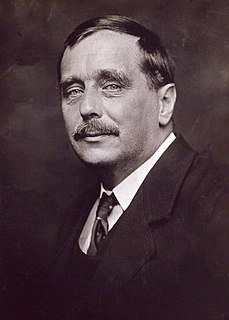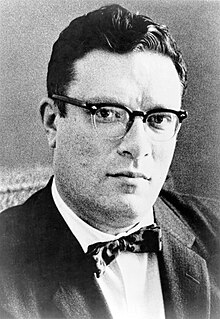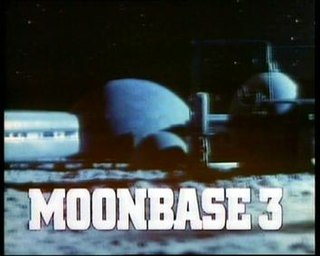
Brian Wilson Aldiss was an English writer and anthology editor, best known for science fiction novels and short stories. His byline reads either Brian W. Aldiss or simply Brian Aldiss, except for occasional pseudonyms during the mid-1960s.

Herbert George Wells was an English writer. Prolific in many genres, he wrote dozens of novels, short stories, and works of social commentary, history, satire, biography and autobiography. His work also included two books on recreational war games. Wells is now best remembered for his science fiction novels and is often called the "father of science fiction", along with Jules Verne and the publisher Hugo Gernsback.

Isaac Asimov was an American writer and professor of biochemistry at Boston University. He was known for his works of science fiction and popular science. Asimov was a prolific writer, and wrote or edited more than 500 books. He also wrote an estimated 90,000 letters and postcards.

Science fiction is a genre of speculative fiction that typically deals with imaginative and futuristic concepts such as advanced science and technology, space exploration, time travel, parallel universes, and extraterrestrial life. It has been called the "literature of ideas", and often explores the potential consequences of scientific, social, and technological innovations.

Stanisław Herman Lem was a Polish writer of science fiction and essays on various subjects, including philosophy, futurology, and literary criticism. Many of his science fiction stories are of satirical and humorous character. Lem's books have been translated into over 50 languages and have sold over 45 million copies. Worldwide, he is best known as the author of the 1961 novel Solaris. In 1976 Theodore Sturgeon wrote that Lem was the most widely read science fiction writer in the world. Lem's science fiction works explore philosophical themes through speculations on technology, the nature of intelligence, the impossibility of communication with and understanding of alien intelligence, despair about human limitations, and humanity's place in the universe. His essays and philosophical books cover these and many other topics.

Leigh Douglass Brackett was an American science fiction writer called "the Queen of Space Opera." She was also a screenwriter known for The Big Sleep (1946), Rio Bravo (1959), and The Long Goodbye (1973). She also worked on an early draft of The Empire Strikes Back (1980), elements of which remained in the film; she died before the film went into production. She was the first woman shortlisted for the Hugo Award. In 2020, she won a Retro Hugo for her novel The Nemesis From Terra, originally published as "Shadow Over Mars".
A future history is a postulated history of the future and is used by authors of science fiction and other speculative fiction to construct a common background for fiction. Sometimes the author publishes a timeline of events in the history, while other times the reader can reconstruct the order of the stories from information provided therein.

Raymond Henry Williams was a Welsh socialist writer, academic, novelist and critic influential within the New Left and in wider culture. His writings on politics, culture, the media and literature contributed to the Marxist critique of culture and the arts. Some 750,000 copies of his books were sold in UK editions alone, and there are many translations available. His work laid foundations for the field of cultural studies and cultural materialism.

Algirdas Jonas "Algis" Budrys was a Lithuanian-American science fiction author, editor, and critic. He was also known under the pen names Frank Mason, Alger Rome, John A. Sentry, William Scarff, and Paul Janvier. He is known for the influential 1960 novel Rogue Moon.
Marge Piercy is an American progressive activist and writer. Her work includes Woman on the Edge of Time; He, She and It, which won the 1993 Arthur C. Clarke Award; and Gone to Soldiers, a New York Times Best Seller and a sweeping historical novel set during World War II. Piercy's work is rooted in her Jewish heritage, Communist social and political activism, and feminist ideals.

William Tenn was the pseudonym of Philip Klass, a British-born American science fiction author, notable for many stories with satirical elements.

Herman Edward Daly is an American ecological and Georgist economist and emeritus professor at the School of Public Policy of University of Maryland, College Park in the United States, best known for his time as a senior economist at the World Bank from 1988 to 1994. In 1996, he was awarded the Right Livelihood Award for "defining a path of ecological economics that integrates the key elements of ethics, quality of life, environment and community."

Garrett James Hardin was an American ecologist who warned of the dangers of human overpopulation. He is most known for his exposition of the tragedy of the commons, in a 1968 paper of the same title in Science, which called attention to "the damage that innocent actions by individuals can inflict on the environment". He is also known for Hardin's First Law of Human Ecology: "We can never do merely one thing. Any intrusion into nature has numerous effects, many of which are unpredictable." He is listed by the Southern Poverty Law Center as a white nationalist, whose publications were "frank in their racism and quasi-fascist ethnonationalism".

Moonbase 3 is a British science fiction television programme that ran for six episodes in 1973. It was a co-production between the BBC, 20th Century Fox and the American ABC network. Created by Doctor Who producer Barry Letts and script editor Terrance Dicks as a realistic alternative strand of TV science-fiction, it was not a commercial or critical success.

Sir Arthur Charles Clarke was an English science-fiction writer, science writer, futurist, inventor, undersea explorer, and television series host.
Romanian science fiction began in the 19th century and gained popularity in Romania during the second half of the 20th century. While a few Romanian science fiction writers were translated into English, none proved popular abroad.

The Eighteenth Brumaire of Louis Napoleon is an essay written by Karl Marx between December 1851 and March 1852, and originally published in 1852 in Die Revolution, a German monthly magazine published in New York City and established by Joseph Weydemeyer. Later English editions, such as an 1869 Hamburg edition, were entitled The Eighteenth Brumaire of Louis Bonaparte.
This is a list of works by Gene Wolfe, an American author of science fiction and fantasy, with a career spanning six decades.
Depending on the counting convention used, and including all titles, charts, and edited collections, there may be currently over 500 books in Isaac Asimov's bibliography— as well as his individual short stories, individual essays, and criticism. For his 100th, 200th, and 300th books, Asimov published Opus 100 (1969), Opus 200 (1979), and Opus 300 (1984), celebrating his writing.














